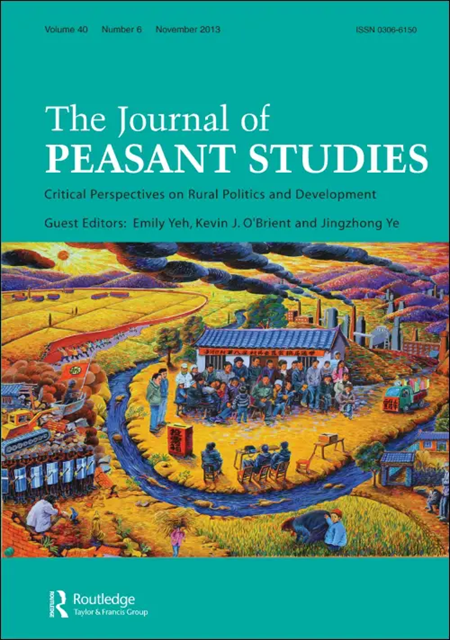Food sovereignty via the ‘peasant way’: a sceptical view
IF 4.8
1区 社会学
Q1 ANTHROPOLOGY
引用次数: 313
Abstract
This paper attempts to identify and assess some of the key elements that ‘frame’ food sovereignty (FS): (1) a comprehensive attack on corporate industrialised agriculture, and its ecological consequences, in the current moment of globalisation, (2) advocacy of a (the) ‘peasant way’ as the basis of a sustainable and socially just food system, and (3) a programme to realise that world-historical goal. While sharing some of the concerns of (1), I am sceptical about (2) because of how FS conceives ‘peasants’, and the claim of some of its leading advocates that small producers who practice agroecological farming – understood as low (external)-input and labour-intensive – can feed the world. This connects with an argument that FS is incapable of constructing a feasible programme (3) to connect the activities of small farmers with the food needs of non-farmers, whose numbers are growing both absolutely and as a proportion of the world's population.通过“农民方式”实现粮食主权:一个怀疑的观点
本文试图识别和评估“构建”粮食主权(FS)的一些关键要素:(1)在全球化的当前时刻对企业工业化农业及其生态后果的全面攻击,(2)倡导“农民方式”作为可持续和社会公正的粮食系统的基础,以及(3)实现世界历史目标的计划。虽然我对(1)有一些担忧,但我对(2)持怀疑态度,因为FS对“农民”的看法,以及它的一些主要倡导者声称,实行农业生态农业的小生产者——被理解为低(外部)投入和劳动密集型——可以养活世界。这与一种观点相联系,即FS无法构建一个可行的计划(3),将小农的活动与非农业人口的粮食需求联系起来,非农业人口的数量无论是绝对数量还是占世界人口的比例都在增长。
本文章由计算机程序翻译,如有差异,请以英文原文为准。
求助全文
约1分钟内获得全文
求助全文
来源期刊

Journal of Peasant Studies
Multiple-
CiteScore
10.50
自引率
17.60%
发文量
99
期刊介绍:
A leading journal in the field of rural politics and development, The Journal of Peasant Studies (JPS) provokes and promotes critical thinking about social structures, institutions, actors and processes of change in and in relation to the rural world. It fosters inquiry into how agrarian power relations between classes and other social groups are created, understood, contested and transformed. JPS pays special attention to questions of ‘agency’ of marginalized groups in agrarian societies, particularly their autonomy and capacity to interpret – and change – their conditions.
 求助内容:
求助内容: 应助结果提醒方式:
应助结果提醒方式:


